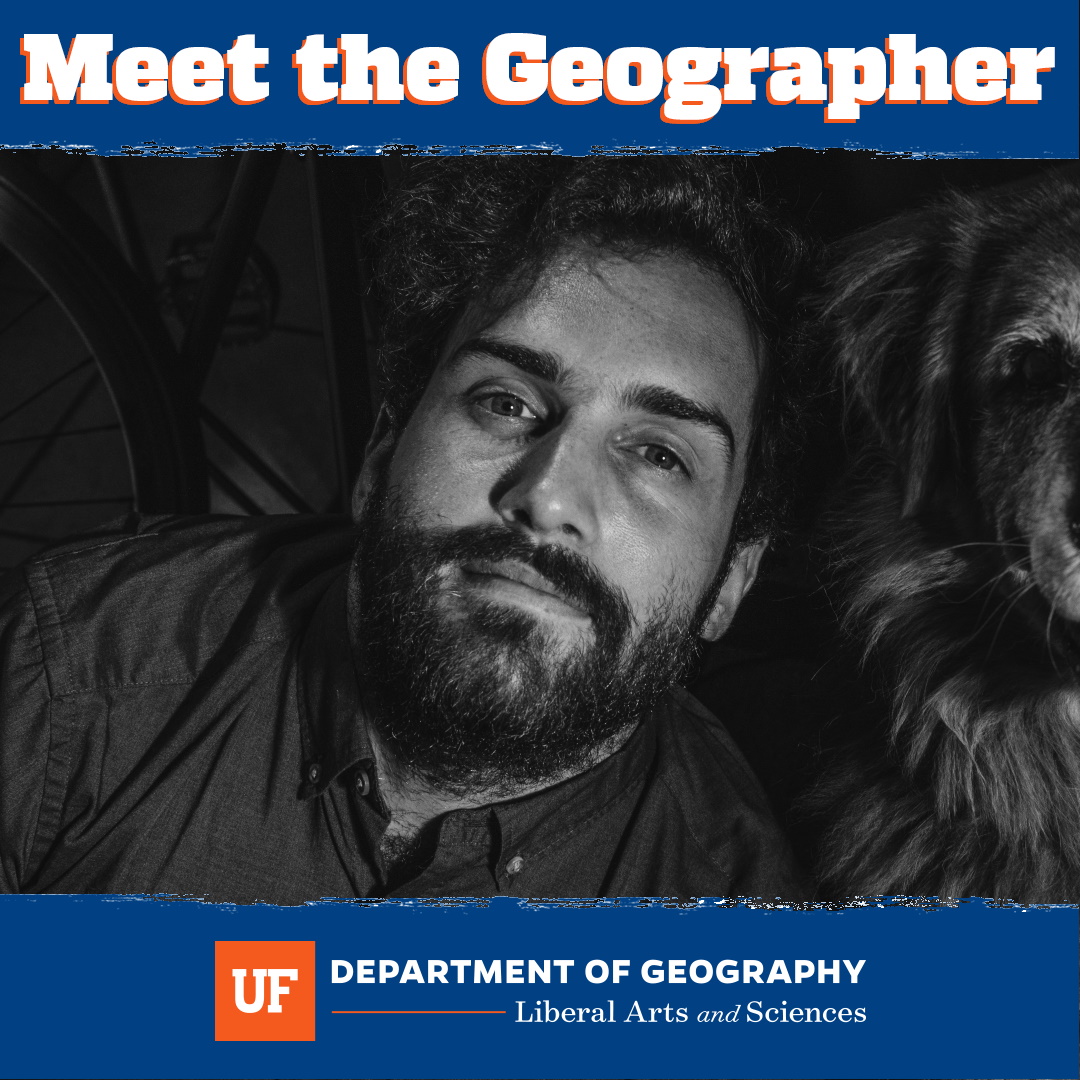
Mike Waylen
Pronouns: he/him
University of Florida
Adviser: Dr. Cynthia Simmons
Focus Area:
Research Statement:
My research interests broadly encompass human-environment interaction with a focus on quantitative and qualitative approaches to political ecology research. I incorporate mixed methodological approaches including spatial econometric techniques, geographic information systems (GIS), and remote sensing as well as policy analysis, interviews, and discourse analysis. My research employs spatially explicit social and environmental data to study social conflicts over water resource management. I specifically investigate the policies, legislation, and global economic production systems that impact water resource-use in the state of Florida. More specifically, my dissertation research brings together trends in groundwater depletion and land system science with aspects of policy analysis and global food systems.
Who is he?
Mike Waylen is a third year PhD student in the Geography Department. He is a native Gainesvillain who studies water resource management.
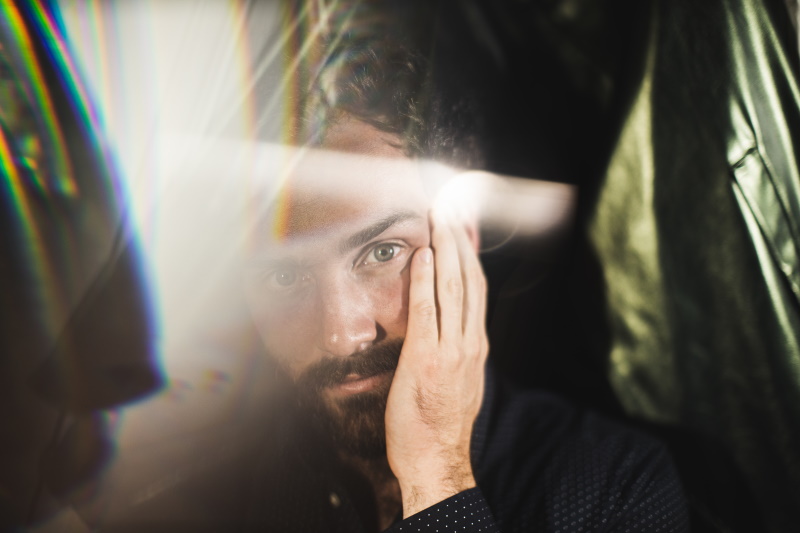
How did he get here?
Mike was born in Gainesville, but moved when his Dad took a position at a university in Canada. After a few years in Canada, his family moved to England for a year, but returned to Gainesville in time for Mike to attend elementary through high school here in Gainesville.
Growing up in town, Mike loved the local music scene. He played in a series of punk bands – Night Train Murderers, The Skavengers, and Sans Culottes – at the now defunct club, “1982”. When he finished high school, Mike took care of his general education requirements and earned an Associate’s degree at Santa Fe College, before transferring to Florida State University.
In 2009, Mike took a 10,000 mile road trip from Gainesville to Vancouver Island and back through the Southwest. Mike and his friend Ian slept in a Toyota Matrix for most of the trip along with some of his sister’s belongings (she was moving to Seattle, WA). Their trip included stops in Seattle, WA; Victoria, BC; Telegraph Cove, BC; and San Francisco, CA. Along the way they spent time in abandoned mining towns and the Coastal Redwood Forest along Highway 101. Mike and Ian did not kill each other.
When he returned from his road trip, Mike finished his AA degree at Santa Fe College and transferred to Florida State University in Spring of 2011. Tallahassee was a nice change of pace, but Mike stayed involved in local music, living in a big house that hosted lots of live shows.”I was always interested in Environmental History, Journalism, and Environmental Studies but Geography afforded me a number of opportunities to expand my methodological toolkit,” says Mike who earned a B.A. in History and Geography, with a minor in Environmental Studies at FSU.
After finishing his bachelor’s degree at FSU, Mike came to the University of Florida for a Master’s degree in Latin American Studies in Fall of 2014.
What’s he been doing at UF?
After finishing his undergraduate degree, Mike had an internship with the Florida Fish and Wildlife Conservation Commission’s Land Acquisition and Inventory Department. It was a good fit with his skills and experience – doing GIS work and archival work on property appraiser data to find candidate properties adjacent to conservation areas that could be used as conservation easements. Before starting graduate school, Mike worked under the guidance of Dr. José Javier Hernández Ayala (Assistant Professor Sonoma State Univ) with work involving Tropical Rainfall Measuring Mission (TRMM) data. While the work was mostly gathering rainfall data from remotely sensed imagery, it gave Mike more experience working with GIS and working on a project.
In 2015, Mike started as a Research Assistant for Dr. Cynthia Simmons working with fellow PhD student Aghane Antunes to create a database of Brazilian infrastructure projects under the “Initiative for the Integration of the Regional Infrastructure of South America” (IIRSA). Mike was tasked with identifying and mapping Brazilian dams, roads, and bridges for Dr. Simmons’ research.
Now that Mike has formally joined the Department as a PhD student, he focuses on the political ecology of water resources in the Suwannee River area with an emphasis on how changing food systems are driving increases in water consumption and pollution. Over the last forty years, the Upper Floridan Aquifer has been lowering – a fact spatially correlated with both increased population density and increased agricultural output. As Florida has moved to an intensive industrial agricultural production system, there are more large scale protein producers who are building Contained Animal Feeding Operations (CAFOs). Mike’s research explores how much waste large scale chicken farms produce, and how local residents and regulators perceive their impact on the local environment. By examining the changing economic and demographic characteristics in census blocks along with changes in the height of the aquifer (based on measurements at wells), and administering surveys to rural residents, agency officials, and organizations like the Ichetucknee Alliance, Mike is modeling how North Florida’s environment is integrated with and impacted by the global food production system.
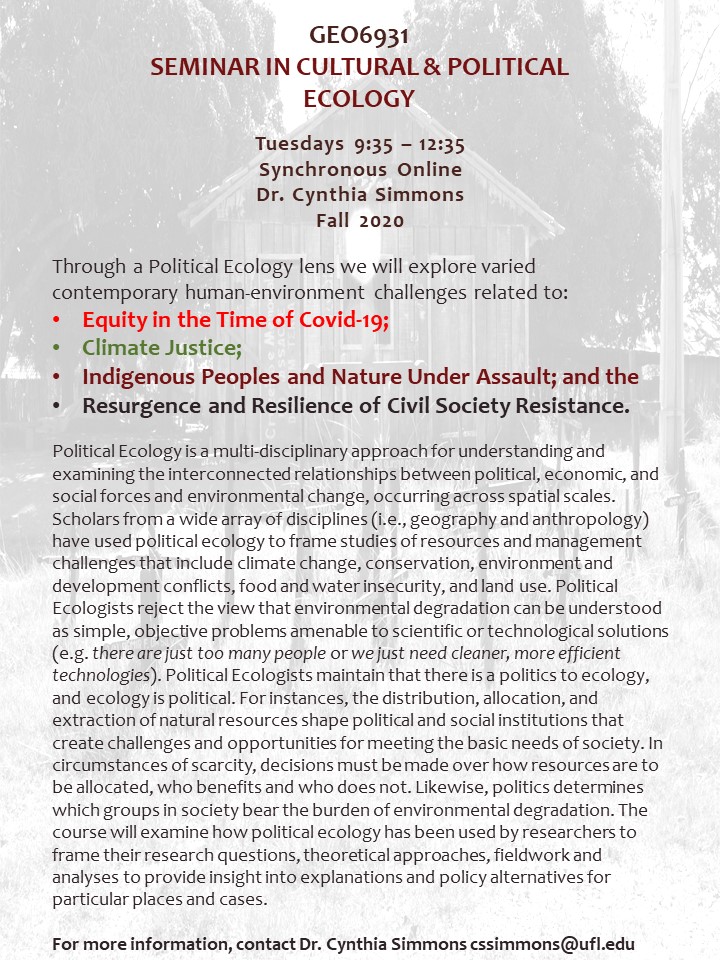
Mike enjoyed Dr. Simmons’ “Political Ecology” course, which provided him with a deep dive into the necessary literature to establish the theoretical basis of his research. He has also brought these perspectives to teaching his undergrad courses GEA3405 GEOGRAPHY OF LATIN AMERICA and GEO2410 SOCIAL GEOGRAPHY, where he enjoyed the opportunity to teach about socio-spatial dimensions of race, gender, ethnicity, sexuality, and environment in Human Geography.
Since joining Dr. Simmons’ lab, Mike has been very productive as a scholar, coauthoring Science in support of Amazonian conservation in the 21st century: the case of Brazil, Discipline and Develop: Destruction of the Brazil Nut Forest in the Lower Amazon Basin, and Avoiding Amazonian Catastrophes: Prospects for Conservation in the 21st Century. He has also provided maps for Dr. Ida Altman’s book The Spanish Caribbean and the Atlantic World in the Long Sixteenth Century, and Dr. Altman’s upcoming book, Life and Society in the Early Spanish Caribbean. Mike has also produced maps for Dr. Robert Walker’s article in The Conversation, “Amazon deforestation, already rising, may spike under Bolsonaro” and “NAFTA’s Cartel Economy”. At the 2020 meeting of the Florida Society of Geographers, Mike won the 2nd Best Graduate Student Presentation.
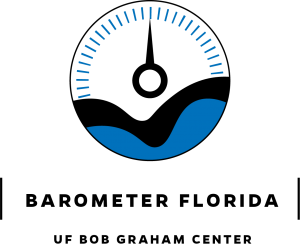
In Fall 2020, Mike started a pre-doctoral fellowship at the Bob Graham Center for Public Service. As the Data Fellow for the Barometer Florida program, Mike will be working with the Graham Center’s Civic Scholars’ efforts to create local, regional and statewide benchmarks on vital issues facing Florida. This year’s scholars will be exploring dimensions of public health at the community level in Florida. Mike is helping the scholars design their study and helping the center organize and store the Barometer Florida data, laying the groundwork for retrospective studies in the coming decades.
How has he been holding up during the pandemic?
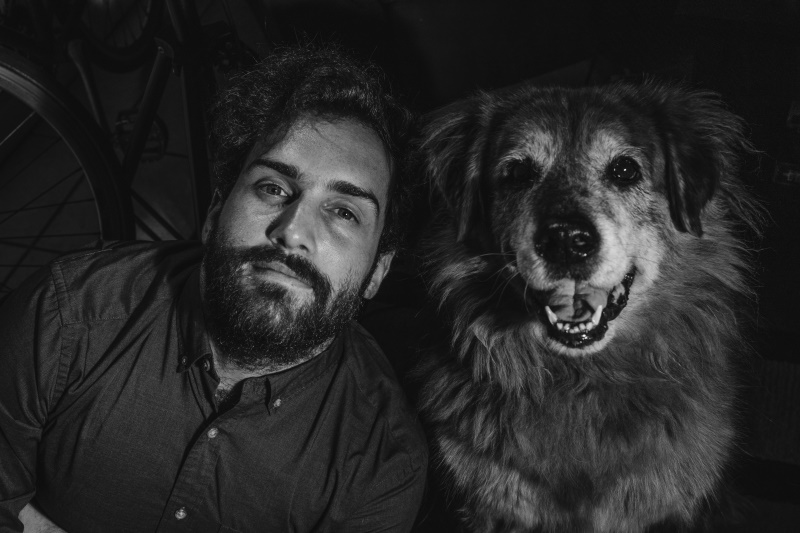
Mike has really missed socializing in the lab and playing Sunday League soccer, but he’s able to find the silver lining in the pandemic. He’s been able to study intensively for his qualifying exams and play more music as well. Mike has also been spending a lot of time outside running, and walking his dog Bruno.
Credit: Mike Ryan Simonovich